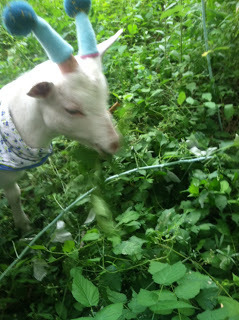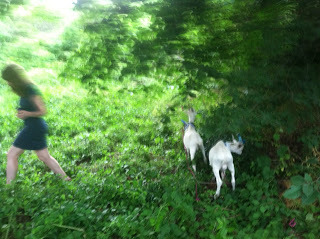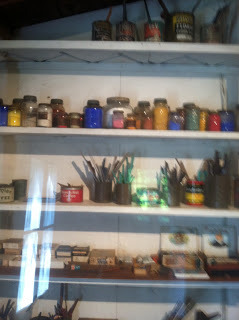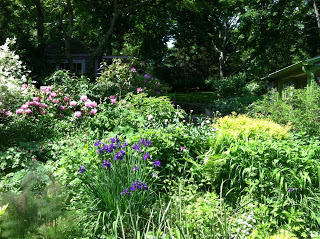Mark Doty's Blog, page 4
June 28, 2012
A summer evening in Amherst
 and great bowls of cucumbers sliced quite thin, and enough little tomatoes (in at least five colors) to feed a military band. I took a nap upstairs, and when I woke there was a rising and falling current of voices below. Soon people were spilling outside onto the terrace, gathered in all the rooms downstairs, and going outside to visit the special guests who appear in the photos here. That's Heather Christle stepping away from two quadrupeds, after feeding them peanuts.
and great bowls of cucumbers sliced quite thin, and enough little tomatoes (in at least five colors) to feed a military band. I took a nap upstairs, and when I woke there was a rising and falling current of voices below. Soon people were spilling outside onto the terrace, gathered in all the rooms downstairs, and going outside to visit the special guests who appear in the photos here. That's Heather Christle stepping away from two quadrupeds, after feeding them peanuts.
June 21, 2012
The stuff from which storms were built

I photographed these jars of pigment this afternoon in Jackson Pollock's barn/studio on Accabonac Harbor in The Springs, here on the South Fork of Long Island. Apologies for the slightly blurry quality of the snapshot; it's a cell phone picture, taken in the not-so-bright antechamber of the larger, high-ceilinged painting space, with its famous spattered floor still bearing the traces of "Autumn Rhythm" and "Blue Poles," two great paintings of mid-century, as well as the spatters and drips of many more. It's an amazing space; I think even if I didn't know who had worked there, or didn't know those pictures, I'd still feel the difficult-too-name quality of energy there, the residual life. It's a kind of hum or buzz or undertow (see how these words feel like proposals quickly discarded?) that lingers in the spaces where great things have been made by a person in a state of profound concentration, perhaps in torment but probably with an equal quotient of joy. The last time I sense this was in Herman Melville's study in Pittsfield, MA, where he wrote all his major work at a table in the center of the a room which is, at least in my memory, a deep red, with a view of a strikingly profiled mountain out the window directly across from his chair. The room made me a little giddy; the atmosphere was vertiginous, electrified.
Last year, during the Abstract Expressionist New York show, a friend of mine was working at MOMA. On a Tuesday, when the Museum is closed, I went to the show with him, and we sat in silence in the grand room full of Pollock's masterworks. Because of their size and vigor, and because I've always seen them in rooms full of people coming and going, commenting, I'd thought of them as loud pictures, announcing themselves with a flourish of trumpets, but they're not. In the room where I Larry and I sat, they seemed the quietest things in the world, deep pulsing wells of silence, radiating a meditative quiet of such depth that one couldn't quite hold back from entering them.
I loved seeing these shelves, the materials out of which those force-fields were made.
May 31, 2012
A garden in The Springs


Two images from my garden in The Springs, one on a warm afternoon near the end of May, the other a rainy morning around the same time. This year, more than ever, the place feels full of mystery to me, invested with a depth I couldn't sense so clearly in the past. I think it's in part that I've changed and added enough now to the garden as I found it that it's begun to feel truly mine; in part it's that I've had Alexander's very real involvement and interest in the place to motivate me. And in part it's the gift of this strange season -- everything two weeks ahead of where it would usually be, and so much rain in May -- after not a drop fell in April -- making everything burgeon. Perhaps a perverse season, but splendor has to be taken where you find it.
I'm writing from the city, here from last night till just tomorrow morning for a few necessary appointments. I have loved New York for years, and I doubt my passion for it is going anywhere, but I'm struck now by how abrasive it feels to come back, after my days out east. The density of bodies, the proximity of concrete and metal to my body, the astonishing level of noise, the thrumming fabric of interaction -- all too much. It's a physical process of adjustment, coming back here, being entered and to some degree re-arranged by the city.
Tonight we walked on the Highline, truly one of the best urban spaces I know. People feel happy to be there, surprised and pleased by aspects of the city they've never seen, New York elevated (literally!) toward its best self. The gardens are just the right combination of simple and lush, the spaces shrink and expand, grow darker and lighter as you move, and the skyline opens in unexpected ways with each movement forward. A new angle on the Hudson, the last sun blazing over the rise on the other side, some pattern of street or unseen building suddenly visible, revealing s handsome shape, or color, or the way it talks to the scene around it. It's a delight.
Though in truth, I'm also thinking about tomorrow, when, as Stanley Kunitz said in stunning poem set in his garden, "another day begins for me,/ as it does each day..." The peonies are open, and the plume poppies setting buds, and the Joe Pye weed is four feet tall already, which makes me wonder how far it will rise in September. I have the sense this year -- never so firmly before -- that my writing resides somehow in the garden, or rather originates there, that it wells up. My work's to attend, to sit, to allow myself to be permeated by the energies dwelling there. It's a gift, the license that is granted to the poet to speak in figures -- I can say exactly how I see it here, that the underlife of the garden rises in a wave which breaks across the door of my studio, and enables the poem to begin -- and trust that if you don't follow my drift, you at least are unlikely to think me entirely out of my mind.
May 30, 2012
About Darius, and the power of reading and writing
http://www.schoollibraryjournal.com/slj/home/894644-312/wv_fifth_grader_donates_10000.html.csp
April 26, 2012
When Women Were Birds
Daringly, this opening is followed by about a dozen blank pages, as if to make that emptiness real to us, to underscore the silence. The unexpected experience of finding so many empty pages in a printed volume does exactly what it should, underscoring the weight of silence, the mysterious resonance of those empty journals -- books shelved, cared for, passed on, and achingly empty.
Terry read a beautifully orchestrated suite of selections from the book, a meditative essay that turns and turns around the question of what to make of this gift. It's a meditation on women and silence, on voice, on anger, on our ability to speak at all.
April 19, 2012
Vita Nuova
The clearest illustration of this came recently, when I took on the project of reading a huge pile of my old poems. David R Godine, the fine New England publisher who put out my first two books of poems, decided to reissue those collections in a new volume. (It's just out, by the way; it's called PARAGON PARK and it's a beautiful edition, with a vintage postcard from the old Nantasket Beach amusement park wrapped around the cover, a very inviting design.) In order to make the re-issue something new, we decided to include a selection of earlier, uncollected poems -- which turned out to be a bigger deal than I'd expected it to be.
I went out to the storeroom, sorted through boxes, pulled out some big piles of pages. Over the years, they've accumulated in a fairly random order, and there's a lot of stuff I wrote between the ages of sixteen or so and thirty-three, when my first full-length book came out. It didn't take long to realize that I wouldn't want anyone to read the vast majority of this stuff. One reason for that is that you simply can't tell what most of the poems are about; they act out emotion, usually longing or rage, without ever acknowledging the sources of these feelings. I didn't always know where these feelings came from, but in truth I certainly knew that I was avoiding talking about my own thwarted sexual life, the deep currents of desire which I had pushed down, as a young man, and attempted to pave over.
I did find a group of poems, written around 1980, that liked fairly well, and in which I thought I started to sound like myself. (What that means is a whole other discussion.) My life was opening, that year,
and I had begun to be more open with myself and with others. Freedom to speak in one area seems to lead to freedom in others -- like a gradually spreading thaw.
That was a long time ago, and my circumstances are completely different ones now. But I have noted how the big changes in my life over the last nine or ten months have made it very difficult to write here; I have been keeping a good portion of my experience cordoned off. Blogs raise complicated issues about privacy and self-disclosure; how much do you want to say, and to whom, and when? Paul and I decided our marriage was at an end in July; it was overdue, I think, and our separation has been an amicable one. I love him and have great respect for him, and I also feel freed by this change and glad to be moving on. But who wants to talk about seismic changes like that, especially when they're brand new, in a blog post? Or on FaceBook?
 I thought I was going to spend a goodly period of time being single, something I've not done for sixteen years. But the forces that move and shift around us (and move and shift us around) had something else in store for me. I've known Alex for nearly three years now, and this summer our relationship shifted swiftly and dramatically. It's clear to me that the door to the next years of my life was waiting to open. There will be much more to come here about the new life; what I wanted to do for now is break this silence, and grant myself permission to speak. (Is there never just one closet, one coming out? Aren't we required to find the nerve to reveal ourselves over and over again? To experience that struggle and consequent coming into the light one more time?)
I thought I was going to spend a goodly period of time being single, something I've not done for sixteen years. But the forces that move and shift around us (and move and shift us around) had something else in store for me. I've known Alex for nearly three years now, and this summer our relationship shifted swiftly and dramatically. It's clear to me that the door to the next years of my life was waiting to open. There will be much more to come here about the new life; what I wanted to do for now is break this silence, and grant myself permission to speak. (Is there never just one closet, one coming out? Aren't we required to find the nerve to reveal ourselves over and over again? To experience that struggle and consequent coming into the light one more time?) That's Alex, up above, this spring in Munich. And here he is (in a photo by our friend Peter Lau) with our little fellow George, who's become inseperable from Ned. Here's the joy in my life.
That's Alex, up above, this spring in Munich. And here he is (in a photo by our friend Peter Lau) with our little fellow George, who's become inseperable from Ned. Here's the joy in my life.January 26, 2012
NYC: Do I contradict myself? Very well then...
Tuesday was the first day of school, and a memorably trying one. I was running late after a morning appointment, missed the train I meant to take to New Brunswick, then hopped onto one scheduled to get me to the train station exactly fifteen minutes before the first meeting of my nonfiction workshop. After a bit of fiddling with the doors, and back-and-forth talk by the conductors over their intercom system -- which for some reason is designed to let everyone hear whatever they have to say to each other -- we pulled out of the station. Slowly. And we didn't get any faster. Then a halt in the tunnel. Start up, speed up, halt before the drawbridge outside of Newark. Start up, speed up, halt: the pattern will be familiar to all riders of New Jersey Transit, where such meltdowns happen at least weekly, to the point where it doesn't seem accurate to call them "meltdowns." They're the order of the day.
I was fifteen minutes late to class, no time to copy syllabus or hand-out, so we just winged it and talked, and the students were (not suprisingly) eager and smart, and happy to be there, so it was all fine.
Later in the day I showed up for my poetry workshop and began to teach a class while the students looked at me with rather bewildered expressions, a collective skepticism I didn't understand until their professor walked in. Pure humiliation. Much later, I sat on an A train -- the express -- while it was parked in Penn Station, watching local train after local train whizz by.
So I arrived home around ten in a thoroughly vile mood, having been out since ten that morning, and Ned and I headed out for a walk around the block. We were strolling on Sixth, under a new, Martian-looking arrangement of scaffolding and brilliant flourescent lights, when Ned decided there was something of paramount interest close to the curb, and ambled over to look. He didn't hurry, and there was no one near us, as far as I knew. But when we got to the curb, a middle-aged woman in tightish black sweats and a stocking cap walked by, and somehow I could feel hostility radiating from her, even though she walked right past and I could only see her back.
I thought, I'm just making this up. Then she turned around and said, with an anger that probably had very little to do with me as an individual, "You acting stupid."
My day had been rough enough to prevent me from thinking before I spoke. With no hesitation I spat back "Fuck you! Be polite."
She muttered something and kept going. It was only when I got around the corner that I started to laugh, realizing that I'd uttered, without thinking, a quintessentially New York statement, the paired contradiction just exactly the everyday sentiment of Metropolis: Fuck you, be polite. Couldn't be more New York, especially if it strikes you as funny thirty seconds after you say it.
January 13, 2012
An Exemplary Sentence (2)
One place was a line of ridge somewhere in a dry Western landscape just after sundown, I saw a pair of coyotes appear suddenly on the ridge edge and come to a loping stop and sniff the air and look down toward a valley in the moonlight, tongues out in a way that looks to us like happiness, though it isn't necessarily; I suppose they were an idea of mammal consciousness come over the event horizon in some pure form, hunter-attention, life-in-the-body attention.
December 27, 2011
An Exemplary Sentence
December 23, 2011
New Years Resolution/Messiah on the NewsHour
Begin again with this: the people at PBS NewsHour have produced a beautiful bit of video for the holiday. I went down to DC and read my poem "Messiah (Christmas Portions)," with a terrific film crew in attendance, at an Episcopal Church in Tenleytown. I have a longstanding distrust of "illustrating" poems in practically any fashion; usually I'd prefer to let the words do the work they were made for. But what producer Anne Davenport and her fellow PBS staffers made here delights me; the poem seems opened out to a wider audience, and the editing's so intelligently done that I don't even notice the cuts in the text made for time's sake. Four minutes on the evening news? What more could a poet ask for -- at least when it comes to speaking in the social space.
Watching this the first time, on television here in the Springs on Wednesday night, I was taken back to the Provincetown church where I heard the town Choral Society give the performance the poem describes. I went, in truth, because there was a guy in the chorus I liked who'd invited me, and I had the impression that he was asking me on a date; in fact, I think he was just beefing up the audience. But in truth my pleasure not dented by the fact that he wasn't interested. All these years later, the poem has another life, removed from its occasion, which is exactly what ought to happen: the originating scene erodes, vanishes in time, and the poem becomes, if one's lucky, free to belong to anyone.
Mark Doty's Blog
- Mark Doty's profile
- 337 followers



